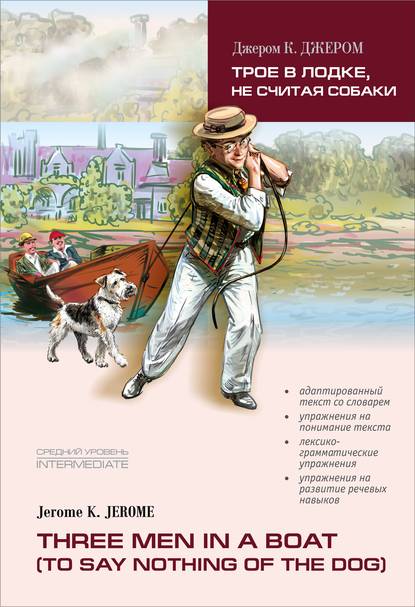
Полная версия:
Three men in a boat / Трое в лодке, не считая собаки. Книга для чтения на английском языке
“Oh, it’s you, is it?” he says, recognizing you at the same moment.
“Yes,” you answer, rubbing your eyes; “what’s happened?”
“The tent’s blown down, I think,” he says. “Where’s Bill?”
Then you both raise up your voices and shout for “Bill!” and the ground beneath you heaves, and the faint voice that you heard before replies from out the ruin:
“Get off my head, can’t you?”
And Bill struggles out in an aggressive mood – he believes that the whole thing has been done on purpose.
In the morning you are all three speechless, having to catch severe colds at night; you also feel very quarrelsome, and you swear at each other in hoarse whispers during the whole of breakfast time.
We therefore decided that we would sleep out at fine nights and in hotel, or inn, like respectable people, when it was wet, or when we wanted a change.
Montmorency greeted this compromise with much approval. He does not enjoy romantic loneliness. To look at Montmorency you would imagine that he was an angel sent upon the earth, for some reason in the shape of a small fox-terrier. There is a sort of Oh-what-a-wicked-world-this-is-and-how-I-wish-I-could-do-so-mething-to-make-it-better-and-nobler expression about Montmorency that has been known to bring the tears into the eyes of old ladies and gentlemen.
When first he came to live at my expense25, I never thought I should be able to get him to stop long26. I used to sit down and look at him, as he sat on the rug and looked up at me, and think: “Oh, that dog will never live. He will be taken to the bright skies that is what will happen to him.” But, when I had paid for about a dozen chickens that he had killed; and had dragged him, growling and kicking, by the scruff of his neck, out of a hundred and fourteen street fights; and an angry woman, who called me a murderer, had brought me a dead cat, then I began to think that maybe they’d let him remain on earth for a bit longer, after all.
Having thus settled the sleeping arrangements to the satisfaction of all four of us, the only thing left to discuss27 was what we should take with us; and this we had begun to argue, when Harris said he’d had enough oratory for one night, and proposed that we should go out and have a smile28, saying that he had found a place, round by the square, where you could really get a drop of Irish worth drinking.
George said he felt thirsty (I never knew George when he didn’t); and the debate was, by common agreement, postponed till the following night; and the assembly put on its hats and went out.
Exercises1. Read the chapter and choose the correct answer.
1. The friends arranged to start
a) next Sunday.
b) next Saturday.
с) next Monday.
2. You can a) never ignore Harris.
b) always inspire Harris.
с) never inspire Harris.
3. Harris always knows a place round the corner where
a) you can get something to drink.
b) you can get some nectar.
с) to eat properly.
4. Camping out in rainy weather is
a) not pleasant.
b) nice and pleasant.
с) wet and damp.
5. To fix a tent in rainy weather is
a) difficult enough.
b) easy enough.
с) extremely difficult.
6. The chief component of diet at supper is
a) bread and butter.
b) rainwater.
с) soup.
7. The friends decided to sleep out
a) at fine nights.
b) when it was wet.
с) when they wanted a change.
8. Montmorency
a) disapproved the compromise.
b) was against the compromise.
с) greeted the compromise with approval.
9. Montmorency looked like
a) a small fox-terrier.
b) a murderer.
с) an angel.
10. The only thing left to discuss was
a) where to sleep.
b) what to take.
с) what to do.
2. Learn the words from the text:
damp, pour, spoil, savage, exclaim, approval, propose, attempt (v), struggle, calmness, arrange, postpone, meanwhile, roar, steadily, swear, quantity, proper, whisper, crowd.
3. Practice the pronunciation of the following words.
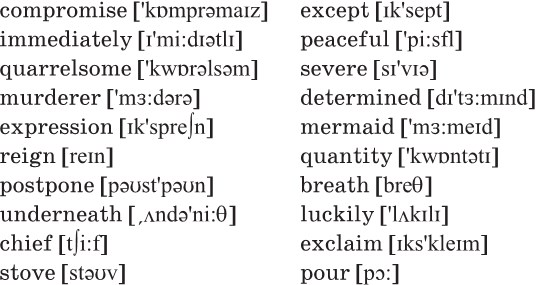
4. Fill in the gaps using the words from the text.
1. George would not … … to get away from the City till the afternoon.
2. The tent is … … and the supper … and … .
3. If Harris’s eyes fill with tears, you can bet it is because Harris … … … raw onions.
4. Harris always … a place … the corner.
5. The rain … … steadily down all the time.
6. You wake up and … that something terrible real -ly … … .
7. And Bill struggles out in an aggressive … – he believes that the whole thing has been done on … .
8. Montmorency … … enjoy romantic loneliness.
9. I … to sit down and look at him, as he … on the rug and … up at me.
10. Harris proposed that we … go out.
5. Match the words with definitions.
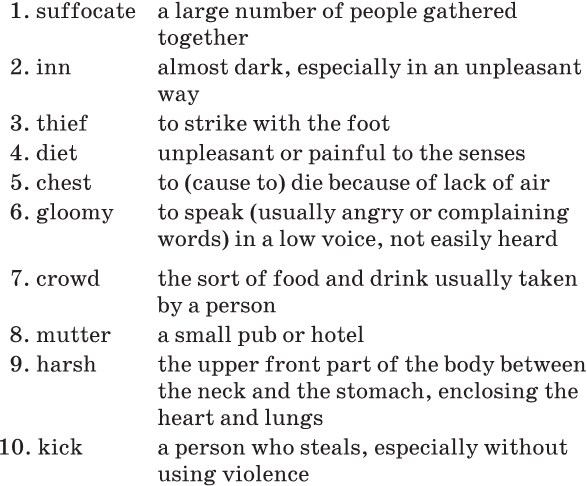
6. Find in the text the English equivalents for:
стряхнуть пепел, простудиться, сводить с ума, лить как из ведра (о дожде), все испортить, в то же время, на одном дыхании, пролить воду, морское дно, по какой-то причине, битва не на жизнь, а на смерть, пролить воду.
7. Find the words in the text for which the following are synonyms:
suggest, gloomy, struggle, everyday, curse, peaceful, realize, arrange, inn, meanwhile.
8. Explain and expand on the following.
1. George would not be able to get away from the City till the afternoon.
2. George and I were for camping out.
3. You can never inspire Harris.
4. Camping out in rainy weather is not pleasant.
5. Rainwater is the chief component of diet at supper.
6. You wake up and realize that something terrible really has happened.
7. To look at Montmorency you would imagine that he was an angel sent upon the earth.
8. Harris said he’d had enough oratory for one night.
9. Answer the following questions.
1. Why do the friends start without Gorge? Will he go with them?
2. What do George and the narrator call “wild and free”? Why?
3. Is it possible to inspire Harris? Give an example.
4. Is camping out pleasant in rainy weather? Why / why not?
5. Is it difficult to fix a tent?
6. What does your supper consist of when camping out in rainy weather?
7. What decision did the friends make?
8. Why does Montmorency look like an angel?
9. What does the narrator think about Montmorency’s staying on earth?
10. What was the last thing to discuss? Did the friends discuss it?
10. Retell the chapter for the persons of the narrator, Harris, George, Montmorency.
CHAPTER III
So, on the following evening, we again assembled, to discuss and arrange our plans.
Harris said:
“Now, the first thing to settle is what to take with us. Now, you get a bit of paper and write down, J., and you get the grocery catalogue, George, and somebody give me a bit of pencil, and then I’ll make out a list.”
That’s Harris all over29 – so ready to take the burden of everything himself, and put it on the backs of other people.
He always reminds me of my poor Uncle Podger. You never saw such an agitation in a house, in all your life, as when my Uncle Podger undertook to do a job. A picture would30 have come home from the frame-maker’s, and be standing in the dining-room, waiting to be put up; and Aunt Podger would ask what was to be done with it, and Uncle Podger would say:
“Oh, you leave that to me. Don’t you, any of you, worry yourselves about that. I’ll do all that.”
And then he would take off his coat, and begin. He would send the girl out for nails, and then one of the boys after her to tell her what size to get; and, from that, he would gradually start the whole house31.
“Now you go and get me my hammer, Will,” he would shout; “and you bring me the rule, Tom; and I shall want the step-ladder, and I had better have a kitchen-chair, too; and, Jim! you run round to Mr. Goggles, and tell him, ‘Pa’s kind regards, and hopes his leg’s better; and will he lend him his spirit-level?’ And don’t you go, Maria, because I shall want somebody to hold me the light; and when the girl comes back, she must go out again for a bit of picture-cord; and Tom! – where’s Tom? – Tom, you come here; I shall want you to hand me up the picture.”
And then he would lift up the picture, and drop it, and it would come out of the frame, and he would try to save the glass, and cut himself; and then he would run round the room, looking for his handkerchief. He could not find his handkerchief, because it was in the pocket of the coat he had taken off, and he did not know where he had put the coat, and all the house had to leave off looking for his tools, and start looking for his coat; while he would dance round and hinder them.
“Doesn’t anybody in the whole house know where my coat is? Six of you! – and you can’t find a coat that I put down not five minutes ago!”
Then he’d get up, and find that he had been sitting on it, and would call out:
“Oh, you can give it up! I’ve found it myself now. You might as well ask the cat to find anything as expect you people to find it.”
And, when half an hour had been spent in tying up his finger, and a new glass had been got, and the tools, and the ladder, and the chair, and the candle had been brought, he would have another go, the whole family, including the girl and the housemaid, standing round in a semi-circle, ready to help. Two people would have to hold the chair, and a third would help him up on it, and hold him there, and a fourth would hand him a nail, and a fifth would pass him up the hammer, and he would take hold of the nail, and drop it.
“There!” he would say, in an injured tone, “now the nail’s gone.”
And we would all have to go down on our knees and look for it, while he would stand on the chair, and grunt, and want to know if he was to be kept there all the evening. The nail would be found at last, but by that time he would have lost the hammer.
“Where’s the hammer? What did I do with the hammer? Great heavens! Seven of you, being round there, and you don’t know what I did with the hammer!”
We would find the hammer for him, and then he would have lost sight32 of the mark he had made on the wall, where the nail was to go in, and each of us had to get up on the chair, beside him, and see if we could find it; and we would each discover it in a different place, and he would call us all fools, one after another, and tell us to get down.
At last, Uncle Podger would get the spot fixed again, and put the point of the nail on it with his left hand, and take the hammer in his right hand. And, with the first blow, he would smash his thumb, and drop the hammer, with a yell, on somebody’s toes.
Aunt Maria would mildly observe that, next time Uncle Podger was going to hammer a nail into the wall, she hoped he’d let her know in time, so that she could make arrangements to go and spend a week with her mother while it was being done.
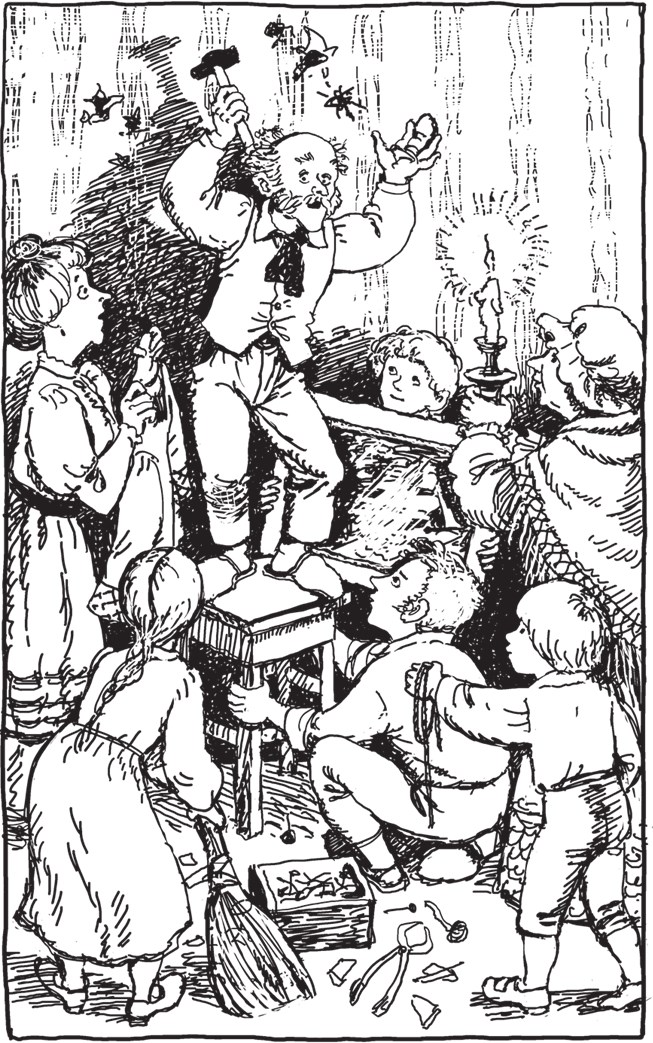
“Oh! you women, you make such a fuss33 over everything,” Uncle Podger would reply. “Why, I like doing a little job of this sort.”
And then he would have another try, and, at the second blow, the nail would go clean through the plaster, and half the hammer after it. Then we had to find the rule and the string again, and a new hole was made;
and, about midnight, the picture would be up – very crooked and insecure, and everybody dead beat and wretched34 – except Uncle Podger.
“There you are,” he would say, stepping heavily off the chair and surveying the mess he had made with evident pride. “Why, some people would have had a man in to do a little thing like that!”
Harris will be just that sort of man when he grows up, I know, and I told him so. I said I could not permit him to take so much labour upon himself.
I said:
“No; you get the paper, and the pencil, and the catalogue, and George write down, and I’ll do the work.”
The first list we made out had to be torn up. It was clear that the Thames would not allow of the navigation of a boat large enough to take the things we had written down.
George said:
“You know we are on a wrong way altogether. We must not think of the things we could do with, but only of the things that we can’t do without35.”
George comes out really sensible at times. You’d be surprised. I call that downright wisdom, not just as regards the present case, but with reference to our trip up the river of life, generally. How many people, on that voyage, load up the boat with a store of foolish things which they think essential to the pleasure and comfort of the trip, but which are really only useless lumber.
How they pile the poor little boat with fine clothes and big houses; with expensive entertainments that nobody enjoys, with formalities and fashions, with pretence, and with – oh, heaviest, maddest lumber of all! – the dread of what will my neighbour think, with luxuries, with pleasures that bore.
It is lumber, man – all lumber! Throw it overboard. It makes the boat so heavy to pull, you nearly can’t row. It makes it so heavy and dangerous to manage, you never know a moment’s freedom from anxiety and care, never gain a moment’s rest for dreamy laziness.
Throw the lumber over, man! Let your boat of life be light, packed with only what you need – a homely home and simple pleasures, one or two friends, worth the name, someone to love and someone to love you, a cat, a dog, and a pipe or two, enough to eat and enough to wear, and a little more than enough to drink; for thirst is a dangerous thing.
You will find the boat easier to pull then, and it will not be so likely to upset, and it will not matter so much if it does upset. You will have time to think as well as to work. Time to drink in life’s sunshine – time to listen to the Aeolian music36 that the wind of God draws from the human heart-strings around us – time to – I beg your pardon, really. I quite forgot.
Well, we left the list to George, and he began it.
“We won’t take a tent,” suggested George; “we will have a boat with a cover. It is ever so much simpler, and more comfortable.”
It seemed a good thought, and we adopted it. I do not know whether you have ever seen the thing I mean. You fix iron hoops up over the boat, and stretch a huge canvas over them, and fasten it down all round, and it converts the boat into a sort of little house, and it is beautifully cosy, though a bit stuffy; but there, everything has its disadvantages, as the man said when his mother-in-law died, and they came down upon him for the funeral expenses.
George said that in that case we must take a rug each, a lamp, some soap, a brush and comb (between us), a toothbrush (each), a basin, some tooth-powder, some shaving tackle, and a couple of big-towels for bathing. I notice that people always make gigantic arrangements for bathing when they are going anywhere near the water, but that they don’t bathe much when they are there.
It is the same when you go to the sea-side. I always determine – when thinking over the matter in London – that I’ll get up early every morning, and go and swim before breakfast, and I religiously pack up a pair of drawers and a bath towel. I always get red bathing drawers. I rather fancy myself in red drawers. They suit my complexion so. But when I get to the sea I don’t feel somehow that I want that early morning bathe nearly so much as I did when I was in town.
On the contrary, I feel more that I want to stop in bed till the last moment, and then come down and have my breakfast. Once or twice I have got out at six and half-dressed myself, and have taken my drawers and towel, and started dismally off. But I haven’t enjoyed it. They seem to keep a specially cutting east wind, waiting for me, when I go to bathe in the early morning; and they pick out all the three-cornered stones, and put them on the top, and they sharpen up the rocks and cover the points over with a bit of sand so that I can’t see them, and they take the sea and put it two miles out, so that I have to huddle myself up37 in my arms and hop, shivering, through six inches of water. And when I do get to the sea, it is rough and quite insulting.
One huge wave catches me up and throws me in a sitting posture, as hard as ever it can, down on to a rock which has been put there for me. And, before I’ve said “Oh! Ugh!” and found out what has gone, the wave comes back and carries me out to mid-ocean. I begin to strike out for38 the shore, and wonder if I shall ever see home and friends again, and wish I’d been kinder to my little sister when a boy (when I was a boy, I mean). Just when I have given up all hope, a wave retires and leaves me sprawling like a star-fish on the sand, and I get up and look back and find that I’ve been swimming for my life in two feet of water. I hop back and dress, and crawl home, where I have to pretend I liked it.
In the present instance, we all talked as if we were going to have a long swim every morning.
George said it was so pleasant to wake up in the boat in the fresh morning, and dive into the clear river. Harris said there was nothing like a swim before breakfast to give you an appetite. He said it always gave him an appetite. George said that if it was going to make Harris eat more than Harris ordinarily ate, then he should protest against Harris having a bath at all.
He said there would be quite enough hard work in pulling sufficient food for Harris up against stream, as it was.
I urged upon George39, however, how much pleasanter it would be to have Harris clean and fresh about the boat, even if we did have to take a few more hundredweight40 of provisions; and he got to see it in my light, and withdrew his opposition to Harris’s bath.
Agreed, finally, that we should take three bath towels, so as not to keep each other waiting.
For clothes, George said two suits of flannel would be sufficient, as we could wash them ourselves, in the river, when they got dirty. We asked him if he had ever tried washing flannels in the river, and he replied: “No, not exactly himself like; but he knew some fellows who had, and it was easy enough;” and Harris and I could hardly believe he knew what he was talking about, and that three respectable young men, without position or influence, and with no experience in washing, could really clean their own shirts and trousers in the river Thames with a bit of soap.
We were to learn in the days to come, when it was too late, that George was a miserable liar, who could evidently have known nothing about the matter. If you had seen these clothes after – but, as the shilling shockers41 say, we anticipate.
Georgу suggested taking a change of underwear and plenty of socks, in case we got upset and wanted a change; also plenty of handkerchiefs, as they would do to wipe things, and a pair of leather boots as well as our boating shoes, as we should want them if we got upset.
Exercises1. Read the chapter and mark the sentences T (true), F (false) or NI (no information).
1. The first thing to settle was what to buy.
2. Harris looks like Uncle Podger.
3. George reminds the narrator of his Uncle Podger.
4. Uncle Podger needs help of his whole family to hang a picture.
5. The first list three friends made was all right.
6. People often load their boats of life with foolish things.
7. The friends decided to take a tent.
8. The narrator likes bathing.
9. George would like to dive in the morning.
10. Some fellows would wash friends’ flannel suits in the river.
2. Learn the words from the text:
agitation, nail, gradually, hammer, handkerchief, tool, grunt, thumb, toe, permit, sensible, wisdom, fasten, canvas, disadvantage, towel, evident, sufficient, remind, injured.
3. Practice the pronunciation of the following words.


4. Fill in the gaps using the words from the text.
1. Now, you get a bit of paper and write …, J., and somebody give me a bit of pencil, and then I … make out a list.
2. He could not find his handkerchief, because it was in the pocket of the coat he … … off, and he did not know where he … put the coat.
3. Two people … have to hold the chair, and a third … help him up on it, and hold him there, and a fourth … hand him a nail, and a fifth … pass him up the hammer, and he … take hold of the nail, and drop it.
4. Harris … be just that sort of man when he … up.
5. We must not think of the things we could do …, but only of the things that we can’t do … .
6. I … your pardon, really. I … forgot.
7. We will have a boat with a cover. It is ever so much …, and … comfortable.
8. I … not know whether you … ever … the thing I mean.
9. One huge wave catches me up and … me in a sitting posture, … hard … ever it can, down on to a rock which … … put there for me.
10. Harris said there … nothing … a swim before breakfast to give you an appetite. He said it always … him an appetite.
5. Match the words with definitions.

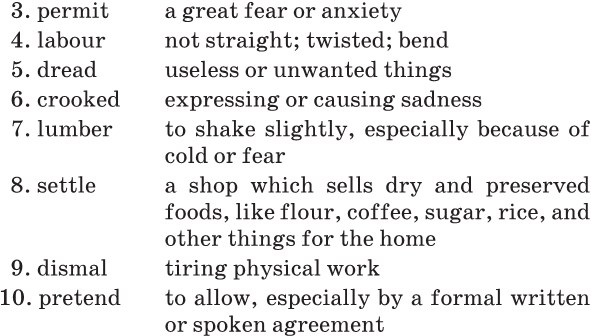
6. Find in the text the English equivalents for:
на следующий вечер, листок бумаги, сказать обиженным тоном, потерять из виду, поднимать шум, вовремя, записать, обходиться без чего-либо, бесполезный хлам, выбрасывать за борт, забегать вперед, на случай если.
7. Find the words in the text for which the following are synonyms:
next, arrange, begin, yell, hand (v), keep, beside, permit, fear, bathe.
8. Explain and expand on the following.
1. That’s Harris all over – so ready to take the burden of everything himself, and put it on the backs of other people.
2. Harris always reminds me of my poor Uncle Podger.
3. Uncle Podger would gradually start the whole house.
4. The first list we made out had to be torn up.
5. Throw the lumber over, man!
6. “We won’t take a tent,” suggested George.
7. I notice that people always make gigantic arrangements for bathing.
8. George said two suits of flannel would be sufficient.
9. Answer the following questions.
1. Who reminds of Uncle Podger? Why?
2. Does Uncle Podger need any help? What help does he need?
3. Why was the first list of things torn up?
4. What does the narrator say about our “boats of life”? What does he mean?
5. How will the friends manage to travel without a tent?
6. Does the narrator swim much when he goes to the sea-side? Why / why not?
7. Who protests against Harris having a bath? Why?
8. Why did George withdraw his opposition?
9. Why would two suits of flannel be sufficient?
10. What set of things did the friends decide to take?
10. Retell the chapter for the persons of the narrator, George, Uncle Podger, Aunt Maria.
CHAPTER IV
Then we discussed the food question. George said:
“Begin with breakfast.” (George is so practical.) “Now for breakfast we shall want a frying pan” – (Harris said it was indigestible) – “a tea-pot and a kettle, and a methylated spirit stove.”
“No oil,” said George, with a significant look; and Harris and I agreed.
We had taken up an oil-stove once, but “never again.” It had been like living in an oil-shop that week. It oozed. We kept it in the nose of the boat, and, from there, it oozed down, filling up the whole boat and everything in it on its way, and it oozed over the river, and saturated the scenery and spoilt the atmosphere. Sometimes a westerly oily wind blew, and at other times an easterly oily wind, and sometimes it blew a northerly oily wind, and maybe a southerly oily wind. At the end of that trip we met together at midnight in a lonely field, under an oak, and took an awful oath never to take paraffine oil with us in a boat again. Therefore, in the present instance, we agreed on methylated spirit. Even that is bad enough. You get methylated pie and methylated cake.



